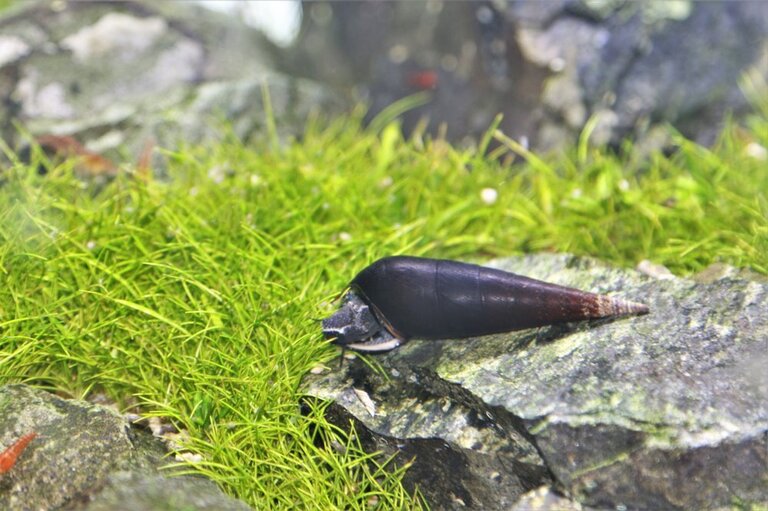Aside from pet fish and live plants, snails are a good addition to an aquarium for more lively scenarios. They’re small, commonly easy to keep and look beautiful.
Here are the 5 best freshwater snails for aquariums that not only meet my above saying but also are friendly to fish and plants.
Faunus Ater (Black Devil Snails)

Black Devil Snails look interesting, at least in my opinion, as their outlook is like obsidian.
While other aquarium items, like algae and plants, are green, your pet fish looks colorful (might be orange, red, purple, or blue), these stand out for its darkish shell.
Two things about them that any aquarist should keep in mind:
A few cases note that they eat live plants but don’t fret, that rarely happens if your tank has lots of algae to munch on.
They are brackish water snails so, in freshwater, their eggs won’t hatch.
Care information:
KH | 5-15 dKH |
GH | 5-8 dGH |
pH | 7.0 to 8.0 |
Nitrate | <30 ppm |
Ammonia/Nitrite | 0 |
Temperature | 22°-26°C (72°-78°F) |
Minimum tank size | 10 gallons |
Diet | Supplement with blanched veggies May munch on delicate plants Uneaten fish food Decaying plant material |
Behavior | Peaceful |
Care level | Easy |
Tylomelania Sp. (Rabbit Snails)

Aside from their reasonably small size and lovely looking, many aquarists love adding them to their fish tank for some practical benefits. The biggest is they leave live plants alone (except Java fern, they will devour it like candy).
Their favorite foods are fish waste around the tank, uneaten fish food, and algae.
Besides, they love digging around in the substrate, which also helps aerate the soil for planted aquariums.
About breeding, it is pretty slow, around 4 to 6 weeks that rabbit snails lay an egg. But that only happens if you have a female and a male in your tank, so if you don’t like to see baby snails in there, keep only one rabbit snail.
Care Information
KH | 5-15 dKH |
GH | 5-8 dGH |
pH | 7.5-8.5 |
Nitrate | <30 ppm |
Ammonia/Nitrite | 0 |
Temperature | 23°-29°C (74°-84°F) |
Minimum tank size | 10 gallons |
Diet | supplement with blanched veggies fish waste uneaten fish food decaying plant material algae |
Behavior | peaceful |
Care level | Easy |
Cipangopaludina Japonica (Japanese Trapdoor Snails)
These snails were commonly kept in ponds but these days, they become more and more popular for fish tank use because they don’t eat live plants (as long as they’re well-fed).
Their food sources are detritus in the aquarium, such as algae, and take note that Japanese Trapdoor Snails have a voracious appetite. They’re also a large snail, around 2” long, therefore, I highly recommend keeping only one (male or female) in your tank.
Aside from cleaning an aquarium, these snails look beautiful.

They come in a variety of species, meaning there are many color options, like dark brown, white, green, or golden.
Their identification characteristics are a twisted conical shell that distinctly gets bigger with each whorl.
Care information
KH | 5-15 dKH |
GH | 5-8 dGH |
pH | 7.0 to 8.0 |
Nitrate | <30 ppm |
Ammonia/Nitrite | 0 |
Temperature | 18°-29°C (64°-84°F) |
Minimum tank size | 15 gallons |
Diet | supplement with blanched veggies uneaten fish food decaying plant material algae |
Behavior | Peaceful |
Care level | Easy |
Pomacea Bridgesii (Mystery Snails)

Talking about the outlook, they are actually a kind of apple snail, with a signature rounded shell that can be purple, black, brown, green, blue, red, golden, or white.
The best thing about this snail is you can easily control their numbers because eggs are commonly laid in the form of large clusters above the waterline (they are in bright pink, for your information). Therefore, it’s easy to remove their eggs and dispose of them.
You can keep more than one mystery snails in your tank, from that point.
About their diet, these guys don’t eat algae much, in turn, they’re good at cleaning up uneaten fish food.
Care information
KH | 5-15 dKH |
GH | 5-8 đGH |
pH | 7.5 to 8.5 |
Nitrate | <30 ppm |
Ammonia/Nitrite | 0 |
Temperature | 20°-28°C (68°-82°F) |
Minimum tank size | 5 gallons |
Diet | supplement with blanched veggies uneaten fish food decaying plant material some algae |
Behavior | Peaceful |
Care level | Easy |
Clea Helena (Assassin Snail)

But if you’re keeping pet snails, kindly consider carefully before choosing these guys.
If used properly, they’re a perfect choice to control naturally the numbers of other snails.
Regardless, they’re well-loved by their beautiful, unique shell with dark brown and yellow stripes throughout it. The common length of this snail is around 1 or 2 inches. You can easily spot them through a glance from a distance.
During the day, they won’t be active much but at night, you’ll see them cruising here to eat.
Care information
pH | 7.0 – 8.0. |
Nitrate | 0 ppm |
Ammonia/Nitrite | 0 ppm |
Temperature | 75 – 80 degrees F |
Minimum tank size | 30 gallons |
Diet | protein-rich supplements blood worms fish flakes some snails (as long as prey is smaller than predator): Ivory Snails, Rabbit Snails, Nerite Snails, etc. most favorite foods: pond Snails, Ramshorn Snails, Malaysian Trumpet Snails, and snails without an operculum |
Behavior | Peaceful with fish and live plants |
Care level | Easy |
Conclusion
Above are the 5 best freshwater snails for aquariums to consider. Take note that they are just the shiniest contender; there’re still a lot of other low-maintenance pet snails, like Trumpet Snails, Ramshorn Snails, Gold Inca Snails, Ivory Snails, and Apple Snails.



